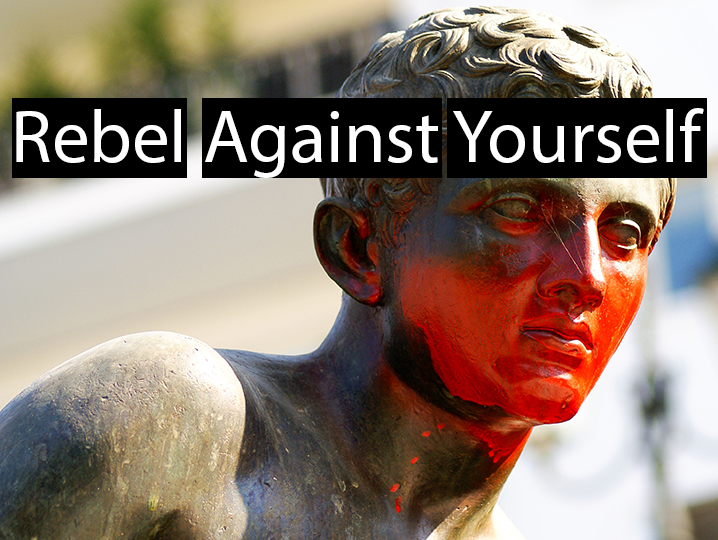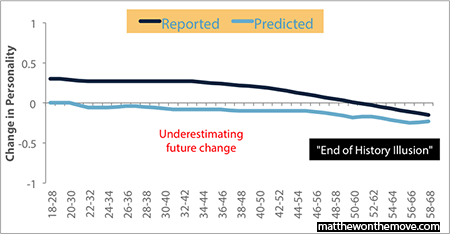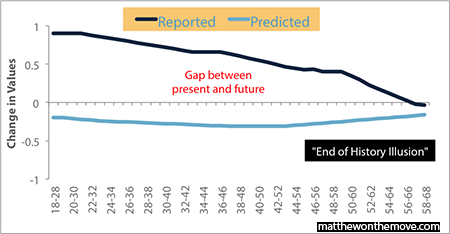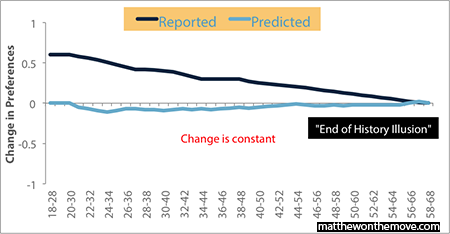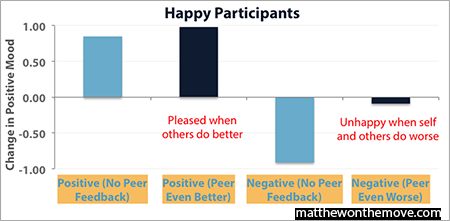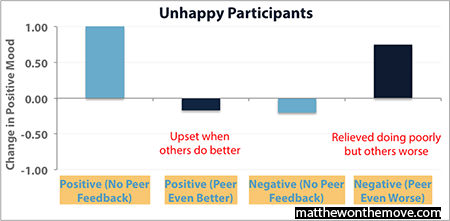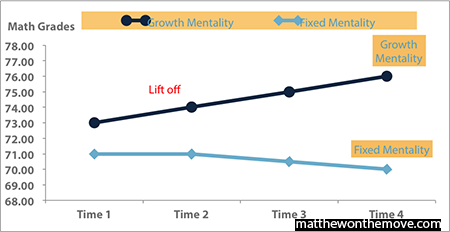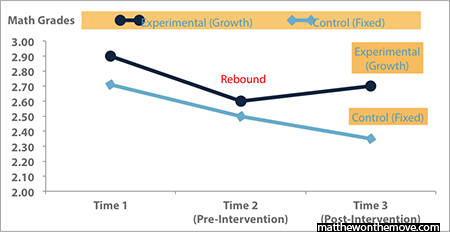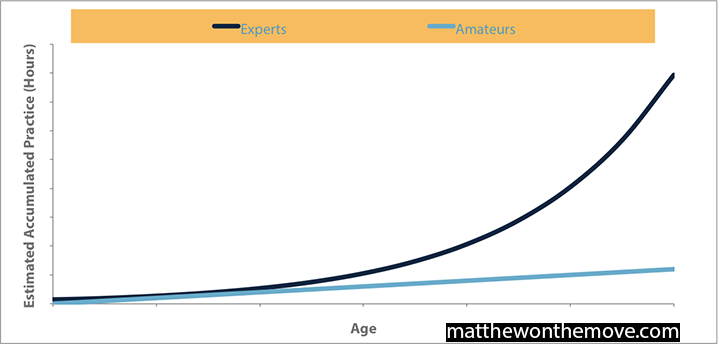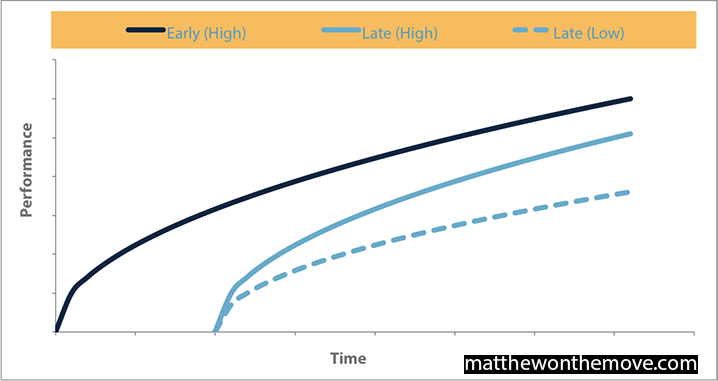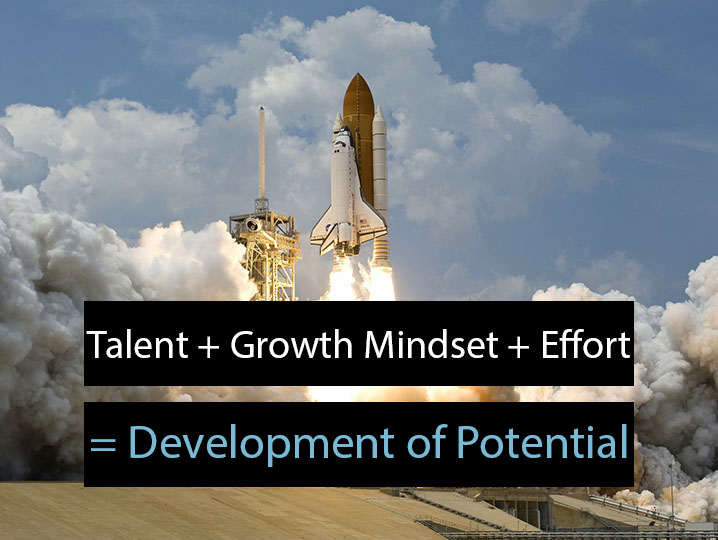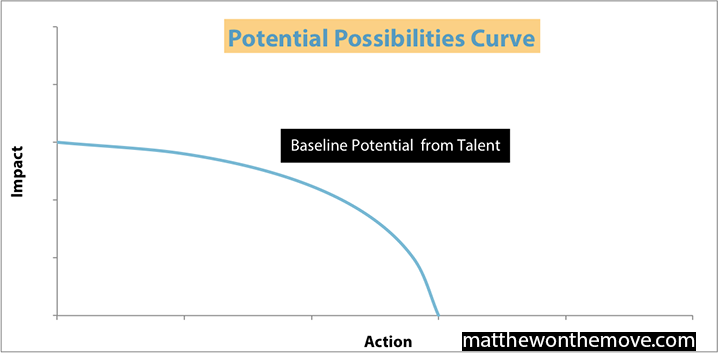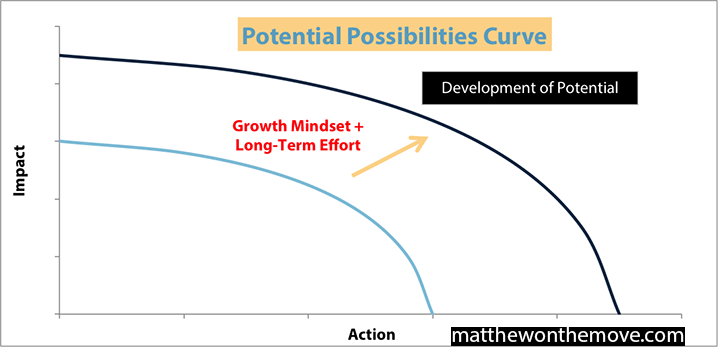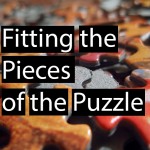Rebel Against Yourself
“Human beings are works in progress that mistakenly think they’re finished.” – Dan Gilbert
We tend to believe that we have finally become the person we were always destined to be. But that’s an illusion. We are in fact very poor predictors of how we will end up being a few years from now, a psychological bias of discounting time and future events. The future is unpredictable as it is by definition a period that has yet to reveal itself, and we may be protecting the construct of our identity and self-esteem by refusing to accept any threat of change or alternative to the person we believe we are now.
We need to rebel against this myth of the fixed nature of the individual and come to terms with the reality that we are constantly in motion: from the trillions of cells in our body to the mental disposition of our personality, values, and preferences. These changes are unique to the individual, demanding that we measure the present self to the past self, and not to others. Correspondingly, we are each capable of developing our potential with a growth mindset and sustained effort over time. With persistence and dedication, all of us can surpass the talents with which we are born. We can all go further when we rebel against ourselves.
Not the Same as Yesterday…
We underestimate the rate of change that we go through in life. In 2013, 19,000 people between the ages of 18-68 were polled online to forecast how they would change in the next decade versus how much they changed in the last decade. The subjects “all believed they had changed a lot in the past but would change relatively little in the future.” This can be seen when in retrospect our actual reported changes over time are much higher than what we had predicted. “People may believe that who they are today is pretty much who they will be tomorrow, despite the fact that it isn’t who they were yesterday.” This is termed the “end of history illusion,” which translates into wrongly believing that we’ve grown into our final selves. An illustration of the results can be seen below:
The End of History Illusion: Predicted vs. Actual Changes
Change is the only constant
Personality
Values
Preferences
Source: The End of History Illusion (illustrative purposes only)
As we can see in the portrayed graphs, the trends do converge over time and into the later years of life. While we may decelerate in our pace of change, we underestimate the extent to which we do change in different aspects: our values (core ideals and principles), our personality (patterns of behavior, the big five personality traits), and our preferences (likes and dislikes).
“What we never seem to realize is that our future selves will look back and think the very same thing about us. At every age we think we’re having the last laugh, and at every age we’re wrong.” (Source)
…And Different from Tomorrow
This misinterpretation of our future selves may contribute toward the feelings of regret from decisions made when younger. When we are young and full of vigor to rebel against a cause, the transient nature of ourselves is not a concept we may always have in mind. So we may decide to overindulge in the short-term at the expense of the long-term, engaging in behavior that is unfavorable to our future selves.
Through adolescence and as younger adults, outward expressions of identity are powerful and direct. They’re in your face and screaming for your attention. We may decide to rebel in how we dress and look, from the outside-in. For instance, my brother glued an aluminium soda can to the top of a 1985 Eagle Wagon for attention (to give the impression to bystanders that he forgot the can accidentally). Such events ensured that my childhood never had a dull moment. To that end, many of us can relate with fond memories of our manifested rebellion in youth.
“To hold the same views at forty as we did at twenty is to have been stupefied for a score of years.” – Robert Louis Stevenson
Rebelling through an outward expression of your appearance in fact squarely puts you in a category through which you are identified and labeled. You end up achieving that which you are so against, misdirecting time and energy resources that could be directed elsewhere. Long after the ink dries and fades on a tattoo, thoughts and ideas carry on and persist. It’s not the tattoos on your arm or your wardrobe that determine who you are, it’s rather that you hold a set of beliefs, a worldview that transcends contexts, time, geographies, and predefined stereotypes of identity. The inner core of your values and character line remain and constantly evolve. Lineage that progresses forward and presses onward beyond circumstances.
This clip from the film “SLC Punk” captures the idea succinctly:
Disciplined Rebellion
More than meets the eye
True rebellion does not necessarily reflect external appearances, but arises from internal discipline to rebel against false assumptions that you are the final version of yourself. Rebellion from the inside-out, not the outside-in. This points to the fact that we are constantly adapting, sentient beings who are capable of change and growth physically and mentally. This change starts from the bottom-up with our anatomy.
Bottom-Up Cell Regeneration
There are an estimated 37.2 trillion cells in your body, calculated from organs and cell types (the number can vary from 15-70 trillion, depending on body size and age). The lifecycle of cells in your body ranges from days (skin), to weeks (liver), to months (red blood cells), to years (skeleton). Your body is permanently regenerating, recycling, and recovering as an interconnected and interdependent living organism.
The person we think we were 10 years ago, today, and 10 years from now may very well all be quite different from one another, physiologically speaking. “Although people may think of their body as a fairly permanent structure, most of it is in a state of constant flux as old cells are discarded and new ones generated in their place” (Source). Just as we shed and renew our cells, our individual identity transforms with time (think end of history illusion). During the course of our lives, we absorb and internalize lessons through an iterative process of self-discovery, experience, knowledge, and wisdom.
“The only way that we can live is if we grow. The only way we can grow is if we change. The only way we can change is if we learn. The only way we can learn is if we are exposed. And the only way that we are exposed is if we throw ourselves into the open.” – C. Joybell C.
Keeping Up with the Joneses
Through this personal journey of change, we should rebel against the impulse to measure ourselves against others. Comparing yourself to others is a wrong starting point for long-term stability of emotions, and has been shown in research to make one less happy overall: “Clinically inspired studies investigating the consequences of mild to moderate depression are similarly suggestive (…) depression appears to be correlated with reliance on social comparison information, especially unfavorable information.” Yet social comparison is a temptation that surfaces very easily. These feelings creep up on me incessantly, demanding my concerted awareness to erase from my thoughts. The focus should instead be on oneself and personal self-development.
Measure the progress of your present self against your former self.
In several experiments in 1997, a sample of 50 females were divided into 25 happy and 25 unhappy individuals, determined from an aggregate of depression rankings (Beck Depression Inventory, Scheier and Carver’s Life Orientation Test, and Rosenberg’s Self-Esteem Scale). Each participant was asked to play a game solving anagrams (e.g. to decode “AFCE” into the word “CAFE”). Consequently, they were provided with feedback on their performance: positive (no social comparison), positive (peer better), negative (no social comparison), negative (peer worse). The reaction to the news between the two groups couldn’t be starker, as portrayed underneath:
Happy vs. Unhappy Comparative Feedback
How you measure up
Happy Participants: Supportive of Others and Aware of Self
Unhappy Participants: Jealous of Others and Indifferent to Self
Source: Hedonic Consequences of Social Comparison: A Contrast of Happy and Unhappy People
As shown in the figure above, self-rated unhappy people are cursed to misery if they do well but others surpass them. Unhappy people only seem to find solace when others are doing worse, even at their own expense when they are performing poorly! How deprived of a life is that? Even when doing well, they only find a morsel of glee when people fare more poorly than they do. This slides into a lose-lose situation, especially for the unhappy lot, as they value poor performance for all – including themselves. Unhappy people are unknowingly self-defeating, compounding problems for themselves in a downward spiral as they wish for the misfortune of others. Devolving to base instincts and jealousy are not the point of this remarkable life opportunity!
The self-reported happy group ”seemed to be governed more by their own outcomes and less by the relevant social comparison information.” The individuals in this group are protecting themselves from realities over which they have no control, which may contribute to a resilient self-concept and greater self-esteem and serenity. Realizing our higher levels of emotions like altruism, generosity, love, kindness, and compassion may require more effort and self-control, but the rewards are all the greater, for everyone. Yes! The height of happiness is reached when we find joy in the success of someone else besides oneself. And that pays dividends as it raises feelings of goodwill from relationships who can later pull us up in times of need as well, while being correlated with a healthy functioning immune system on a cellular and molecular level.
As the researchers concluded in their social comparison study:
“Possibilities of negative social comparisons with friends, mates, and colleagues (not to mention characters from Lifestyles of the Rich and Famous) are ubiquitous in everyday life. Such comparisons may be misleading and destructive. Feeling dejected as a result of other people’s successes and taking satisfaction from their failures, seems a poor prescription for happiness (and an even poorer strategy for winning friends and influencing people). Attending primarily to one’s own outcomes, acknowledging others’ successes without envy, and taking little satisfaction in their failures seems to offer a better prescription for wellbeing.“
To be sure, modest amounts of comparison can stimulate competition and incentive to improve, but obsession over the outcome of others brings a life filled with frustration and unhappiness.
Physics for the Mind: Fixed vs. Growth Mentality
“An object at rest stays at rest and an object in motion stays in motion unless acted upon by an outside force.” – Newton’s First Law of Motion (Law of Inertia)
Just as physics are governed by Newton’s laws, the mind is characterized by similar laws of motion. Intelligence can be delineated into two frameworks: a fixed entity or one that can be developed incrementally. These modes of approaching intelligence can carry sweeping significance over grades, self-confidence, achievements, and lifetime earnings. Just as Newton’s law of universal gravitation ensures that the Earth revolves around the Sun and that we stay grounded to her surface, theories around intelligence and mindset have real-world implications!
Two studies carried out in 2007 at Stanford and Colombia University validated that holding an incremental view towards intelligence contributes to better test scores in a classroom environment versus a fixed entity view of intelligence. The first study looked at 373 7th graders (12 year olds) over the course of 2 years who all started on equal footing academically. Those students who saw intelligence as a malleable quality outperformed ones who saw intelligence as fixed, and the achievement gap widened over the course of 2 years (see graph below). Moreover, growth mindset students reported higher emphasis on the effectiveness of effort, placed a premium on learning goals, and engaged with setbacks more healthily, viewing them as situational instead of ability-based, compared to fixed entity peers. In other words, the achievers didn’t see failure as a helpless consequence of themselves, but that a better result required more time investment or a positive pivot in strategy.
Viewing Intelligence: Fixed vs. Growth (Study 1)
Believe in yourself
Source: Implicit Theories of Intelligence Predict Achievement Across an Adolescent Transition: A Longitudinal Study and an Intervention (illustrative purposes only)
In the second study, nearly 100 7th grade students with worsening grades were segregated into two categories and participated in 8 weeks of workshop interventions. One experimental group was taught that intelligence can be developed, reading a key article entitled “You Can Grow Your Intelligence,” explaining how nerve cells can become stronger after learning something new through practice. The control group only learned how memory works and received advice for remembering information.
At the start of the study, all of these students were dropping in their math scores. Those students who learned about the growth mentality demonstrated a rebound in their grades, while the control group that received no such encouragement continued to slide in their grades. This differentiation in performance was not as apparent in earlier years in schooling, when subjects were easier to grasp, as the authors note: “these findings support the idea that the diverging achievement patterns emerge only during a challenging transition.” This is critical because it clearly and definitively shows the resilience of bouncing back, especially in challenging situations, when accompanied by a positive, growth mindset!
Viewing Intelligence: Fixed vs. Growth (Study 2)
Down and back again
Source: Implicit Theories of Intelligence Predict Achievement Across an Adolescent Transition: A Longitudinal Study and an Intervention (illustrative purposes only)
We can extrapolate that one’s brain is like a muscle that becomes stronger through exercise. We are always so concerned about our body’s physical condition, with much less prominence placed on mental health and our frame of mind. We need to absolutely rebel against this ill-conceived notion that intelligence and potential are fixed and cannot be increased. This fixed mentality inadvertently serves to undermine the limits of our success and how far we go in life.
“A mind that is stretched by a new experience can never go back to its old dimensions.” – Oliver Wendell Holmes
A growth mentality where gains to intelligence can occur incrementally does not mean that everyone has the same abilities. Rather, it means that each individual can improve on a unique tangent and on their own pace.
How can we stay the course to improve, despite setbacks and challenges? The answer lies in the concept called grit.
Keep Grinding: Practice Makes Perfect
Grit is defined as “perseverance and passion for long-term goals,” as in the 2006 study “Grit: Perseverance and Passion for Long-Term Goals” conducted by Angela Duckworth and colleagues.
Grit is following through on what you set out to do, and excludes intelligence, talent, or biology. People with grit – through their applied efforts, concentration, and drive – tend to achieve higher levels of performance. The students in the earlier study who possessed a growth mentality were grittier students: they overcame their academic difficulties in decisive fashion!
“Grit is living life like it’s a marathon, not a sprint.” (Source)
It simply takes time to go through life from crawling, to walking, to running. I mean this literally in a physical sense with transformation as we grow older from an infant through childhood to adulthood, as well as an analogy to development of potential. This element of time was investigated in 1993, when researchers summarized extensive research on amateurs and experts in chess players, musicians, athletes, and painters in the paper entitled, “The Role of Deliberate Practice in the Acquisition of Expert Performance.” The researchers would conclude: “Many characteristics once believed to reflect innate talent are actually the result of intense practice extended for a minimum of 10 years.”
“If you can’t fly then run, if you can’t run then walk, if you can’t walk then crawl, but whatever you do you have to keep moving forward.” – Martin Luther King Jr.
This relates to a major thesis in the popular book “Outliers: The Story of Success” by Malcolm Gladwell, who argues for the much-publicized 10,000 hour rule, where success is a result of 10,000 hours honed to a specific task. Specific numbers aside, the cut between amateurs and experts is a matter of practice, time, and resolve. As the researchers in the practice meta-analysis determined, cumulative practice grew exponentially over time for experts when measured against amateurs.
Estimated Accumulated Practice: Experts vs. Amateurs
Putting in the time
Source: The Role of Deliberate Practice in the Acquisition of Expert Performance (illustrative purposes only)
Practicing day in and day out can be a grind, but that doesn’t diminish from its effectiveness. In a later study on spelling bees success in 2011, Angela Duckworth and her team would find that: “Deliberate practice was a better predictor of National Spelling Bee performance than either being quizzed by others or engaging in leisure reading.”
Putting your nose to the grindstone is at times how we learn, through difficulty, boredom and all. Unsurprisingly, and as can be observed empirically, earlier is better to mature in one’s expertise. To grow into one’s shoes so to speak. In the world of competing for expertise, being a first mover is important.
Time and Performance with Varying Levels of Effort
Start early and work hard to get ahead
Source: The Role of Deliberate Practice in the Acquisition of Expert Performance (illustrative purposes only)
As researchers in the 10 year practice study assert: “Only a few exceptions, most notably height, are genetically prescribed. Instead, we argue that the differences between expert performers and normal adults reflect a life-long period of deliberate effort to improve performance in a specific domain.”
Similarly, Angela Duckworth and colleagues would conclude in their original 2006 grit study that “the achievement of difficult goals entails not only talent but also the sustained and focused application of talent over time.”
Focus, dedication, and persistence over time are applicable to many, if not all domains in life. Across writing, learning, and sports, practice does make perfect.
Launchpad for Growth: Potential Possibilities Curve
“Nothing in the world can take the place of persistence. Talent will not; nothing is more common than unsuccessful men with talent. Genius will not; unrewarded genius is almost a proverb. Education alone will not; the world is full of educated derelicts. Persistence and determination alone are omnipotent. “ – Calvin Coolidge, 30th President of the United States
Putting together the concepts of talent, a growth mindset, grit, practice, and performance allows us to now compose a formula for reaching stretch goals and developing our potential:
Talent (baseline) + Growth Mindset (variable) + Long-Term Effort (variable) = Development of Potential
It’s the mental attachment and your long-term effort that constitute the development of your potential. Moving past your talent and rebelling against your fixed mindset coupled with persistence yields the development of potential. Your baseline talent can be a launchpad for future growth when combined with a growth mindset and long-term effort.
We can plot how these variables can enhance the impact from our actions on a potential possibilities curve, before and after we apply ourselves:
Potential Possibilities Curve
Raise your sphere of influence
The Baseline Scenario from Talent
Developed Potential Scenario: Growth Mindset + Long-Term Effort
Source: Matthewonthemove.com
We can conclude from the potential possibilities curves above that developed potential enables one to produce much greater impact from action, amplifying one’s sphere of influence. A higher sphere of influence enables one to become more effective in delivering additional output and value for each unit of input and activity. To push the frontier outward and do more.
My Own Struggle with Potential
This resonates with me so strongly since I have gone through the experience myself of being told I was someone who couldn’t learn. When I was the age of 5 entering first grade, I didn’t believe that I would ever learn the days of the week, or the months of the year. I was discouraged in seeing others around me master subjects.
Then I was fortunate enough enter the 1st grade taught by Mrs. Thompson, who believed in her pupils. She tenderly encouraged me to the idea that I could in fact learn. She turned my attention towards myself and to making slow, but steady, progress. I was at first in a fixed mindset but eventually started adopting a growth mindset of bettering myself and believing in my own abilities. The whole year was painful and demanding… but gradually learning became easier as I gained confidence in discovering, becoming familiar, recognizing, remembering, and finally learning new lessons.
Rebelling against yourself is so intensely personal and close to my heart because I very well could have ended up entirely differently in a negative way. I was so damn lucky to have a teacher who believed in me and taught me to rebel against my false sense of low self-esteem. To understand that I too can grow, that I am not static, but a dynamic child who had been placed in the wrong conditions. My mother was alert to the reality that the earlier pre-school of non-English speakers where I was enrolled created a vicious cycle that was taking a toll on my self-confidence. I was raised bilingually from my parents, and I would speak a jumble of French and English that only bilinguals could piece together to understand. To a monoglot, I must’ve sounded incoherent and foolish. Thankfully my mother had the wisdom and courage to pull me from this environment and set me on a new path.
Patience is a Virtue
Through my own difficulties I observed that change and development frustratingly take time, despite our expectation and desire for instant gratification. In line with the fast rate of change we observe from the adoption of technology, we expect our lives to go through such leaps and bounds as well. Technology moves forward at the exponential rate of Moore’s Law, but us humans require more time to overcome tests of control. Society is screaming for us to be rewarded now, not later.
As written in the earlier social comparison experiment:
“Opportunities for such social comparison are ubiquitous, as everyday social interactions and the media inundate us with information about other people’s accomplishments, actions, and lifestyles.”
This transparency across acquaintances, friends, and loved ones means we are constantly inundated with the highlights of people we know: the honey moons, the births, the promotions, the life adventures… prompting us to reflect and question why not us? Self-indulgence is knocking at our door.
Yet on the other side of the impatience coin emerges a bleaker picture. Impatience is linked to less income, more spending on tobacco and alcohol, and lower savings rates. As a matter of fact, present-oriented individuals who highly discount time (i.e. now is important) may be unemployed for longer, earn worse grades, encounter teenage pregnancy, and/or be more likely to engage in criminal behavior, among other undesirable life outcomes.
This is a jolting reminder that we should stretch our time horizons to appropriately accommodate this gradual and protracted rate of development inherent in humans. Arm ourselves with a growth mindset and endeavor to put forth our best efforts whenever and wherever possible.
Rebel Against Yourself
You are what you eat. You are also what you decide to do everyday, the culmination of your choices. Avoiding regret is no easy matter, but it seems to be inextricably linked to choices we make.
“Everything in your life is a reflection of a choice you once made. If you want different results, make different choices.”
Choose to rebel against learned helplessness, against thinking you are in final form and are fixed to who you are from birth. You’re not, you very well may change tomorrow. Protect yourself against despair and distress by keeping your eye on personal progress, as opposed to peer comparison. Take joy in their talents and successful pursuits. It’s proven to improve well-being and promote emotional stability. Remain undeterred in the face of challenge. Understand that you are not limited to who you are now and that you can and will improve with time and effort. Instead of falling into the trap of “I’m not smart enough,” think “I didn’t study the right way” or “I didn’t study hard enough.” You can and will do better with the right approach and dedication.
Ask yourself how gritty you are and what steps you’ve taken to expand your potential possibilities curve. What’s the scope of your impact? Your sphere of influence and value that you can add from your own actions? Not only the value to yourself, but to other lives that you can support. What are your strengths and opportunity costs of how you spend your time – do you rely on talent instead of seeking to acquire new skills? Human potential is not capped, it represents only a snapshot along the road to improvement.
Rebel against the notion that you are the final version of yourself, and pursue a growth mindset and long-term effort to reach beyond who you are today.
Rebellion does not only occur through action, but also through introspection.
Don’t stop discovering, don’t stop pushing. Keep searching, keep exploring, keep learning. Question, reflect, challenge.
Rebel against yourself.
—
Appendix: Further Reading
How can we expand our potential and tenacity to grow? These broad points are by no means exhaustive, but have helped me in my continued struggle to rebel against myself:
- Take control of your circumstances
- Put aside things you have no ability to impact – compare yourself to your former self
-
Live in the present – now – while internalizing past lessons and considering future implications
-
Use feedback analysis to determine progress and adjustments
-
Take joy in the success of others
-
Concern yourself only with progress, not gossip or drama
- Remain grateful – embrace the bronze medalist mentality
- Exhibit generosity and help others
Managing Oneself is one of the most important and thorough articles on understanding and developing oneself to live a life of excellence. Key quotes from the article:
- “A person can perform only from strength. One cannot build performance on weaknesses, let alone on something one cannot do at all.”
- “Taking pride in such ignorance is self-defeating. Go to work on acquiring the skills and knowledge you need to fully realize your strengths.”
Briefly stated, I strive to adhere to this doctrine:
“Valuing people, continuing to grow, practicing the golden rule, being authentic, exhibiting good values, living out the right priorities.” – How Successful People Lead, John Maxwell
